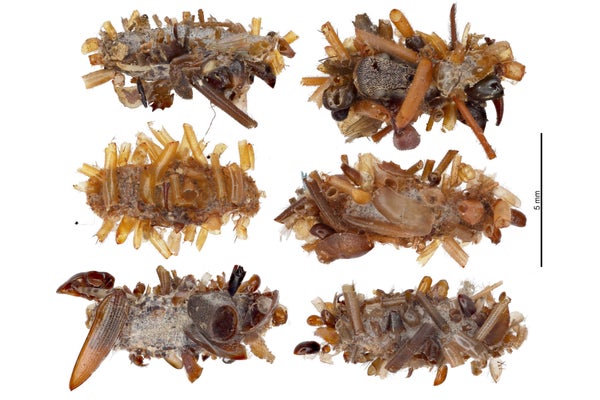Carnivorous ‘Bone Collector’ Caterpillars Wear Corpses as Camouflage
Nicknamed the “bone collector,” this newly confirmed caterpillar in Hawaii secretly scrounges off a spider landlord by covering itself with dead insect body parts

Caterpillars nicknamed the “bone collector” create protective shelling out of dead insect bones and body parts.
Rubinoff lab, Entomology Section, University of Hawaii, Manoa
Caterpillars are known for their fuzzy exterior and sometimes weird behavior. Some vibrate aggressively to scare predators; others create their own antifreeze to survive the cold. But a newly identified member of the offbeat caterpillar club might be the weirdest of all. Nicknamed the “bone collector,” it builds a disguise from insect cadavers it scrounges from a spiderweb, covering its body with these spider-meal leftovers—and occasionally engaging in cannibalism.
It took researchers almost 17 years to convince themselves that this behavior was not some kind of anomaly among a couple of individuals. After meticulous observations and fieldwork, they finally confirmed that bone collector caterpillars, with all their macabre eccentricity, are the larvae of a new species that is native to the Hawaiian island of Oahu. The finding was published on Thursday in Science.

Bone collector larva in web.
Rubinoff lab, Entomology Section, University of Hawaii, Manoa
On supporting science journalism
If you’re enjoying this article, consider supporting our award-winning journalism by subscribing. By purchasing a subscription you are helping to ensure the future of impactful stories about the discoveries and ideas shaping our world today.
“I just couldn’t believe it. The first couple of times you find that, you think it’s got to be a one-off—it’s got to be a mistake,” says the study’s lead author Daniel Rubinoff, an entomologist at the University of Hawai’i at Manoa. “I’ve been looking at it for over a decade,…
Read the full article here
